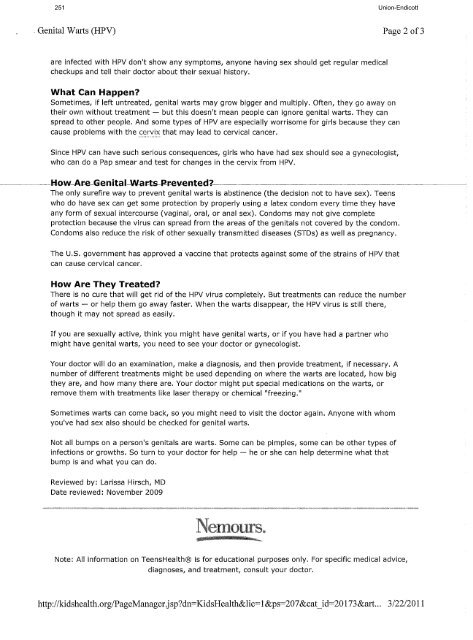t - New York Civil Liberties Union
t - New York Civil Liberties Union
t - New York Civil Liberties Union
Create successful ePaper yourself
Turn your PDF publications into a flip-book with our unique Google optimized e-Paper software.
251<br />
<strong>Union</strong>-Endicott<br />
· Genital Warts (HPV) Page 2 of3<br />
are infected with HPV don't show any symptoms, anyone having sex should get regular medical<br />
checkups and tell their doctor about their sexual history.<br />
What Can Happen?<br />
Sometimes, if left untreated, genital warts may grow bigger and multiply. Often, they go away on<br />
their own without treatment - but this doesn't mean people can ignore genital warts. They can<br />
spread to other people. And some types of HPV are especially worrisome for girls because they can<br />
cause problems with the .c.~.r~i~that may lead to cervical cancer.<br />
Since HPV can have such serious consequences, girls who have had sex should see a gynecologist,<br />
who can do a Pap smear and test for changes in the cervix from HPV.<br />
----How-A~e-GenitaLWads-e.~ev.ented-?~----------------------<br />
The only surefire way to prevent genital warts is abstinence (the decision not to have sex). Teens<br />
who do have sex can get some protection by properly using a latex condom every time they have<br />
any form of sexual intercourse (vaginal, oral, or anal sex). Condoms may not give complete<br />
protection because the virus can spread from the areas of the genitals not covered by the condom.<br />
Condoms also reduce the risk of other sexually transmitted<br />
diseases (STDs) as well as pregnancy.<br />
The U.S. government has approved a vaccine that protects against some of the strains of HPV that<br />
can cause cervical cancer.<br />
How Are They Treated?<br />
There is no cure that will get rid of the HPV virus completely. But treatments can reduce the number<br />
of warts - or help them go away faster. When the warts disappear, the HPV virus is still there,<br />
though it may not spread as easily.<br />
If you are sexually active, think you might have genital warts, or if you have had a partner who<br />
might have genital warts, you need to see your doctor or gynecologist.<br />
Your doctor will do an examination, make a diagnosis, and then provide treatment, if necessary. A<br />
number of different treatments might be used depending on where the warts are located, how big<br />
they are, and how many there are. Your doctor might put special medications on the warts, or<br />
remove them with treatments like laser therapy or chemical "freezing."<br />
Sometimes warts can come back, so you might need to visit the doctor again. Anyone with whom<br />
you've had sex also should be checked for genital warts.<br />
Not all bumps on a person's genitals are warts. Some can be pimples, some can be other types of<br />
infections or growths. So turn to your doctor for help - he or she can help determine what that<br />
bump is and what you can do.<br />
Reviewed by: Larissa Hirsch, MD<br />
Date reviewed: November 2009<br />
_il<br />
·.....IUI,"-.<br />
Note: All information on TeensHealth® is for educational purposes only. For specific medical advice,<br />
diagnoses, and treatment,<br />
consult your doctor.<br />
http://kidshealth.org/PageManager.j sp?dn= KidsHealth&lic= 1&ps=207 &cat_id=20 173&art... 3/22/2011















